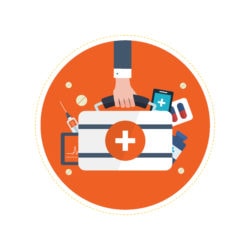There are several reasons why more and more healthcare providers and administration staff are working from home these days.
It’s a trend that definitely started during the pandemic. The COVID-19 pandemic forced many healthcare providers and administration staff to work from home. This move helped reduce the spread of the virus, protect critical workers, while also ensuring continuous access to healthcare for patients. Remote services and telehealth successfully made medical care more accessible to patients for whom traveling to appointments is difficult, risky, or far. Remote consultations and telemedicine services have become more common during the pandemic and may continue to be used more frequently in the future.
Working from home has also proved to be cost-effective for healthcare providers and administration staff in many cases. It eliminates the need for extra office space and other related expenses. Plus, remote activities have gifted healthcare providers and admin personnel with greater flexibility and work-life balance.
Of course, this reverse migration—from the office to the home—was made possible by technology. Advances in technology not only made it possible for healthcare providers and administrative staff to work remotely, they have made it easy and efficient. With the right software, devices, and infrastructure in place, they have been able to carry on with many of their duties from anywhere with an internet connection.
Is it a HIPAA Violation to Work from Home?
No. Even before the pandemic, WFH was possible without committing a HIPAA violation. But, there are 10 measures that need to be taken to ensure that medical staff remain HIPAA compliant while working remotely.
During the pandemic, more doctors, physicians, and other medical practitioners are working from home than ever. With the help relaxed HIPAA regulations on the use of telecommunications and the advancement of telemedicine, practitioners have been able treat more patients remotely. Potential penalties for non-compliance were waived during this emergency period for good-faith use of telehealth. But the law was not removed, HIPAA compliance is still necessary.
Your idea of working from home seem pretty cozy. You imagine sitting in your pajamas and your pet keeping you company. But for medical practitioners, working remotely involves some special precautions to ensure patient privacy and data security.
Tools to Help you Stay HIPAA-Compliant While Working from Home
When working from home in a healthcare-related role, it’s important to ensure that the tools and gadgets you use are HIPAA compliant. Here are some examples of gadgets that can help support HIPAA compliance:
- Encryption software: Encryption software can help ensure that any sensitive patient data you send or receive is protected. Some popular options include BitLocker (for Windows devices) and FileVault (for Mac devices).
Headsets with encryption: These gadgets can encrypt audio communications from end to end, ensuring that any sensitive information is protected from the point it is transmitted until the point it is received. This can help ensure that audio communications related to patient data are HIPAA-compliant.
- HIPAA-compliant video conferencing platform: When it comes to choosing a platform for HIPAA-compliant video conferencing, there are several options available. Here are some of the best platforms for HIPAA-compliant video conferencing:
- Zoom is a popular video conferencing platform that offers a HIPAA-compliant version of its software. The HIPAA-compliant version of Zoom includes features such as end-to-end encryption, access controls, and a BAA (Business Associate Agreement) to ensure that the platform meets HIPAA requirements.
- Microsoft Teams is another popular video conferencing platform that offers a HIPAA-compliant version of its software. The HIPAA-compliant version of Teams includes features such as end-to-end encryption, access controls, and a BAA to ensure that the platform meets HIPAA requirements.
- Cisco Webex is a video conferencing platform that offers a HIPAA-compliant version of its software. The HIPAA-compliant version of Webex includes features such as end-to-end encryption, access controls, and a BAA to ensure that the platform meets HIPAA requirements.
- Doxy.me is a video conferencing platform designed specifically for healthcare providers. The platform is HIPAA-compliant and includes features such as end-to-end encryption, access controls, and a BAA to ensure that it meets HIPAA requirements.
- Secure messaging apps: Using a secure messaging app can help you communicate with other healthcare providers and administration staff while keeping patient data secure. Some popular options include Signal, WhatsApp, and Telegram.
- Virtual Private Network (VPN): A VPN can help you securely access your organization’s network from home. This can help protect patient data and ensure that you are accessing the network in a HIPAA-compliant way.
- Remote desktop: Using a remote desktop can support HIPAA compliance while working from home in several ways. These include limiting access and recording access logs, automatic logoff after a certain period of inactivity, and security monitoring to identify any unusual activity.
- Password management software: Password management software and single sign-on apps can help you create and manage strong passwords for all of your accounts. Some popular options include LastPass and HeyLogin.
- Webcams with privacy shutters: A webcam with a built-in privacy shutter can help ensure that your video consultations with patients are secure and HIPAA-compliant. Some popular options include the Logitech C920 and the Microsoft LifeCam HD-3000.
- Monitor privacy screens: HIPAA regulations require healthcare providers to take reasonable measures to protect patient privacy. Using a privacy screen can help ensure that patient information is kept confidential. A privacy screen is a physical filter that can be attached to your monitor, making it difficult for anyone sitting next to you or looking over your shoulder to see what you are working on. It can help prevent accidental exposure of patient information to family members, roommates, or visitors who may be present in your home while you are working.
Overall, it’s important to work with your organization’s IT team to ensure that any gadgets or tools you use when working from home are HIPAA-compliant and meet the necessary security standards.
15 Ways to Stay HIPAA Compliant When Working from Home
- Limit Access.
It’s important to limit access to PHI when working remotely in order to stay HIPAA compliant. PHI should only be accessed and handled by authorized staff members. When working remotely, limit access to only those staff members that need it to carry out their work. Keep a record of which employees have access to certain types of sensitive information.
- Use HIPAA-Compliant Tools.
Not all platforms and apps for voice and video communications are engineered to protect patient privacy and PHI. Technologies to support either conversations between doctors and other staff or between doctors and patients, should be selected carefully. It’s important to choose one that will continue to fit requirements even after the pandemic, when regulations are expected to go back into full vigor.
Public-facing applications and social media platforms are not appropriate and do not ensure patient privacy.
Find examples of HIPAA-compliant videoconferencing tools.
- Set Strong Passwords.
When accessing PHI remotely, it’s important to use strong passwords in order to stay HIPAA compliant. Be sure that videoconferencing and file-sharing is password-protected to help protect sensitive data. Medical staff should also change the passwords on their home wireless routers using a strong password.
First, passwords should be at least 8 characters long. They should also include a mix of uppercase and lowercase letters, numbers, and special characters. Additionally, passwords should not be easy to guess, such as your name or birthdate. Using a single sign-on solution that is designed for use in the medical industry can help your staff keep PHI secure and easily access the information they need, without needing to remember a lot of complicated passwords.
- Secure Remote Access.
There are a number of reasons why securing remote access to protected health information (PHI) is an important compliance measure for HIPAA-covered entities.
If doctors and medical staff are using a platform to login to office computer and access patient data remotely, some extra security measures should be in place. In addition to strong passwords, access should require two-factor authentication. Requiring employees to use a VPN provides safe remote access from any location through public internet connections or private Wi-Fi. Then, when they are done using a device for work purposes, they should securely sign out.
- Ensure Encryption.
Encryption is when data is coded so that unauthorized users can’t utilize data and then uncoded so that only authorized users can understand the information. This security measure is especially important in a work from home environment. It should be implemented at nearly every step in the flow of PHI. This includes configuring wireless routers, email exchange, work and personal devices that are used to handle patient information, for example.
Encryption is a key tool in protecting sensitive patient data from unauthorized access. When encryption is used, the data is converted into a code that can only be decrypted by authorized individuals. This ensures that only those with the proper permissions can view or use the data.
Healthcare providers and third-party service providers often transmit patient data via e-mail, text messages, and other electronic means. This data may include sensitive information such as patient names, medical records, test results, and health insurance information. And, without data encryption, this PHI could be accessed by unauthorized individuals, meaning that patient privacy has been breached the misuse of personal health information (PHI).
Encrypted messaging is one way that providers can maintain the security and confidentiality of their patients’ information and safeguard against unauthorized access. Any time PHI is transmitted electronically, it should be encrypted. This includes any type of file being sent via email, text message, or instant message. PHI should also be encrypted when stored on laptops, flash drives, and other portable devices.
- Stay Up to Date.
Updating software and apps is an important measure for staying HIPAA compliant while working remotely. By keeping systems up to date, you can help ensure that patient data remains confidential and secure. Additionally, updating software can help prevent malware and other cybersecurity attacks.
Ensure that any computer, smartphone or other devices that are being used to access patient information and communicate with staff and patients is up to date. Install all software patches and security updates that are available for that device and operating system. Make sure all software, apps, and antivirus software are up to date with the latest security threats.
If you have IT support, they should check that every device accessing the network is properly configured, encrypted, password protected, and equipped with firewalls and anti-virus software.
- Plan for Smooth Call Management.
Managing phone calls is another important measure for staying HIPAA compliant while working remotely. When handling PHI over the phone, it’s important to take steps to protect patient privacy and confidentiality; but not all outsourced call centers understand that.
Rely on a HIPAA-compliant medical answering service to forward calls from your office to staff working from home. This type of service can also help prioritize incoming calls so that staff can save time and handle patient requests more efficiently. External medical answering services are able to triage patients over the phone, update information through your EMR, schedule in-office appointments, or connect them directly through your preferred telemedicine platform.
- Enforce Security Policies.
Enforcing security policies is important for HIPAA compliance because it helps to prevent unauthorized changes to data that could jeopardize its accuracy or integrity. Enforcement is often accomplished through procedural measures, such as requiring employees to undergo background checks or providing training on security policies.
Make sure that all of your staff who are working from home are familiar with your information security policies. This covers storing and disposing of PHI and devices that are used to access PHI. Employees should understand that they cannot allow other people (including friends and family) to use devices that contain sensitive data. Require employees to read and sign a clear BYOD Usage Agreement and Confidentiality Policy.
- Handle Physical Data with Care.
If employees have a habit of printing and storing hard copies of patient information in their home office, they should have a dedicated storage space that is kept under lock and key. Any paper documents with this type of information must be shredded before it can be thrown away. This also includes physical security measures, such as keeping servers in a secure location and using badge readers to control access to certain restricted areas.
- Store PHI in Approved Locations.
Security policies should also outline safe storage procedures for private information. Employees need to know where data can be securely stored and what constitutes unauthorized use of data outside of the company network. Specifically address the use of external hard drives, discs, flash drives, and private computer storage.
- Use Virtual Private Networks (VPNs).
A VPN can help to create a secure connection between two devices over the internet; it can create a secure connection even if you are using public Wi-Fi. A VPN encrypts all data that passes through it, which means that even if someone were to intercept your data, they would not be able to read it. This is important because if you are working with confidential patient information, you need to make sure that it is always protected.
In addition, a VPN can also help to prevent data breaches. If a hacker were to try to access your data, they would only be able to see the encrypted data, which would be useless to them. This is critical when accessing PHI remotely.
- Keep Devices Secure.
All devices that are used to access PHI should be kept secure. This includes laptops, smartphones, and tablets. Make sure that all devices are password protected and that only authorized staff members have access to them.
- Destroy PHI When No Longer Needed.
When you no longer need to keep PHI on your devices or in your files, make sure to destroy it properly. PHI should be shredded, burned, wiping or destroying electronic files, or otherwise destroyed so that it cannot be accessed by unauthorized individuals. This helps to ensure that PHI is not used for fraud or other malicious purposes.
- Implement Strong Authentication Methods.
In order to prevent unauthorized access, staff members should be required to use strong authentication methods when logging into company systems. This could include two-factor authentication, which requires the use of a password and a second form of identification, such as a fingerprint or token.
- Use Secure Connections.
Even when working remotely, all connections should be encrypted and use industry standard protocols, such as SSL/TLS, when sending or receiving PHI. This includes email messages, file transfers, and any other data transmissions. Using a secure connection is one of the first steps needed to help prevent data breaches and ensure that patient information remains confidential.
Related article: 10 Steps for Staying HIPAA Compliant While Working from Home.
WFH Helps Alleviate Healthcare Labor Shortages & Burnout
WFH became the ‘new normal’ for many non-clinical staff who do not need to be physically present in healthcare facilities during the pandemic. But this trend has not gone away since returning to ‘business as normal.’
Today, the option to work from home is helping to ease the labor shortage and staffing issues in healthcare today in several ways. For example, by allowing healthcare providers and administration staff to work from home, organizations can expand their pool of potential employees beyond their local area. This has helped to fill positions that were difficult to fill previously, particularly in areas with high demand for healthcare services.
Additionally, offering the option to work from home can help healthcare organizations to retain their existing employees who may be considering leaving due to factors like long commutes or a lack of work-life balance. And this remote flexibility naturally leads to better morale and career satisfaction and a lower rate of turnover—something that healthcare is already struggling with. Offering the option to work from home can help to reduce stress and burnout by providing a more flexible and comfortable work environment.
Related article: Innovative Solutions to Augment Short-Staffed Medical Practices.
Physician Answering Services that Comply with HIPAA – Remote Work Support
Your medical practice can operate securely and productively from home with the aid of PatientCalls. By implementing three tiers of authentication for remote agents, our service goes above and beyond normal HIPAA regulations. PatientCalls can help your medical practice to work from home securely and efficiently. Our service exceed typical HIPAA requirements by deploying three layers of authentication for remote agents.
Contact our experts today to learn more about our customized call management solutions and innovative integration capabilities.







